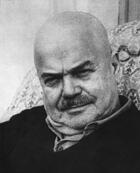
A Russian critic, writer and pamphleteer, he was one of the first theoreticians of so-called Russian formalism. During the war, he served as a commissar in the Red Army. He was the founder of the Opoyaz (Society for the Study of Poetic Language), one of two groups, with the Moscow Linguistic Circle, that developed the critical theories and techniques of Russian formalism. In addition to literary criticism and biographies of authors such as Maksim Gorky, Leo Tolstoy and Vladimir Mayakovsky, he wrote several semi-autobiographical works presented as fiction. Shklovsky developed the concept of "estrangement" in literature: "The purpose of art is to impart the sensation of things as they are perceived and not as they are known (or conceived). The technique of art of "missing" objects, of making shapes difficult, of increasing the difficulty and magnitude of perception finds its reason in that the process of perception is not aesthetic as an end in itself and must be prolonged. Art is a way of experiencing the artistic quality or essence of an object; The object is not the important thing." Shklovsky's work brought Russian formalists closer to an understanding of literary activity as an integral part of social practice, an idea that would later become important in the work of other prominent figures and institutions such as Mikhail Bakhtin, the Prague School or the Tartu-Moscow Semiotic School.




